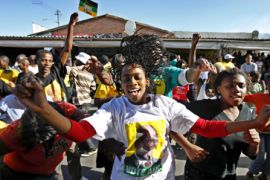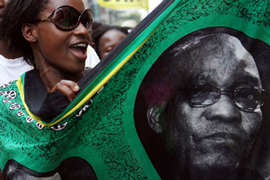South Africa’s long walk to vote
Fifteen years after first vote, euphoria has made way for more tempered expectations.

 |
| Nelson Mandela is expected to again cast his vote along with millions of others [GALLO/GETTY] |
It was a crisp autumn day in 1994 when a 75-year-old man voted for the first time in a South African election.
The incandescent smile on Nelson Mandela’s face was the defining moment in the birth of a new democracy – when nearly 20 million people joined the African National Congress (ANC) president at the polls.
It was a process full of joy, tinged with relief.
Those who had predicted widespread violence were proved wrong, and the transition of a country from apartheid pariah to a non-racial Rainbow Nation was completed when, a few weeks later, Mandela was inaugurated as president and the ANC government formally took power.
Fifteen years later, more than 23 million people are registered to vote.
It is predicted that more than 75 per cent of those registered will actually cast their ballots in a process that has not lost its lustre.
| South African election 2009 |
|
|
The right to vote, which came out of decades of struggle, is something that is still treasured.
But the euphoria of 1994 has dissipated. This is the third time that national elections have been held since then, and the promise that the lives of all would change has been tempered in the passing years.
There have been major advancements in the quality of life of some. More youths are at school than at any time in the country’s past, more people have access to clean water and primary healthcare clinics than ever before.
There has been a widespread redistribution of wealth that, in past decades, was largely in the hands of the white minority.
Underpinning the nation is a democratic constitution that, so far, has defied those who wish to infringe on the rights of others.
Yet there remains a massive gap between the rich and the poor. The unofficial unemployment rate is in the region of 40 per cent, millions of people continue to live below the poverty line, and there is a widespread perception among many that while they may have the vote, they remain economically disfranchised.
ANC dominance
The ANC has remained politically supreme throughout the past 15 years and, since the election in 1999, it has held more than two-thirds of the 400 seats in parliament – which in effect gives it the power to amend all laws, including the constitution itself.
This was the year in which Thabo Mbeki succeeded Mandela as president: and he was a man very different from his predecessor with a very different leadership style.
 |
| Zuma’s election as ANC leader over Mbeki led to the creation of breakaway party Cope [AFP] |
The Mbeki administration came under particular criticism for its policies on HIV and Aids, or rather the lack of them.
The president himself questioned the link between HIV and Aids, and publicly supported a health minister who espoused traditional remedies such as beetroot and garlic to cure the virus.
Amid this controversy, the rollout of available anti-retroviral drugs – seen as a key in combating Aids – was delayed, in the eyes of many, unforgivably so.
The Mbeki years were also marked by allegations of widespread government corruption – particularly in reference to a multi billion dollar arms deal that his administration brokered.
The name of the then deputy president, Jacob Zuma, featured prominently in the allegations. In 2005, he was fired by Mbeki and subsequently formally charged on several criminal counts. He was never tried.
In recent weeks, the National Prosecuting Authority finally announced it would not proceed with a trial that it believed it could not win, and all charges against Zuma were dropped.
In the years since 2005, Zuma increasingly forged a separate political clique within the once united ANC.
Bitter political war
His followers insisted he was a scapegoat, some going as far as to claim that the charges were part of a plot to remove him from the race to take over from Mbeki as president of the ANC and of the country.
| In video |
|
|
| Al Jazeera’s Haru Mutasa travels through South Africa |
 Kimberley miners hit by economic slowdown Kimberley miners hit by economic slowdown South Africans face lack of basic services South Africans face lack of basic services  Security a key issue in South African elections Security a key issue in South African elections |
It was a bitter political argument between those who had once fought a war of liberation together.
In December 2007, Zuma defeated Mbeki in the ANC presidential election by a large margin and, in September 2008, Mbeki resigned as president of South Africa.
Within weeks, the ANC had split. A group of prominent members broke away and formed a new party, the Congress of the People or Cope.
They argue that Zuma and his followers have betrayed the organisation’s principles which were established at its inception in 1910 and that the ANC is no longer the movement that spearheaded the struggle against apartheid and the victory over it.
The split within ANC ranks has also served to galvanise the traditional opposition parties.
The Democratic Alliance (DA) is, in particular, insistent that it will gain a large number of seats in parliament, and that it will dramatically improve its standing in the provincial elections that take place at the same time as the national one.
There is no one who would predict that the ANC would actually lose these elections.
However, with the emergence of Cope and an apparent new dynamic within the DA, the ability of the ANC to hold on to its two-thirds majority in parliament is seriously in question.
Without the two-thirds majority, the ANC would rely on other parties to pass any major legislation, the years in which it could act unilaterally, if it so chose, would be over.
Ultimately, the 2009 elections are a true watershed in political process. The infant democracy introduced in 1994 is now, perhaps, transformed into a more mature and tested system.
The euphoria of 15 years ago is replaced with a sense that it is one thing to attain democracy, another to maintain it.
Along with millions of others, Nelson Mandela is expected to again cast his vote on April 22. The right to vote no longer a cause for celebration, but perhaps the wider political choice that faces South Africans now is.
